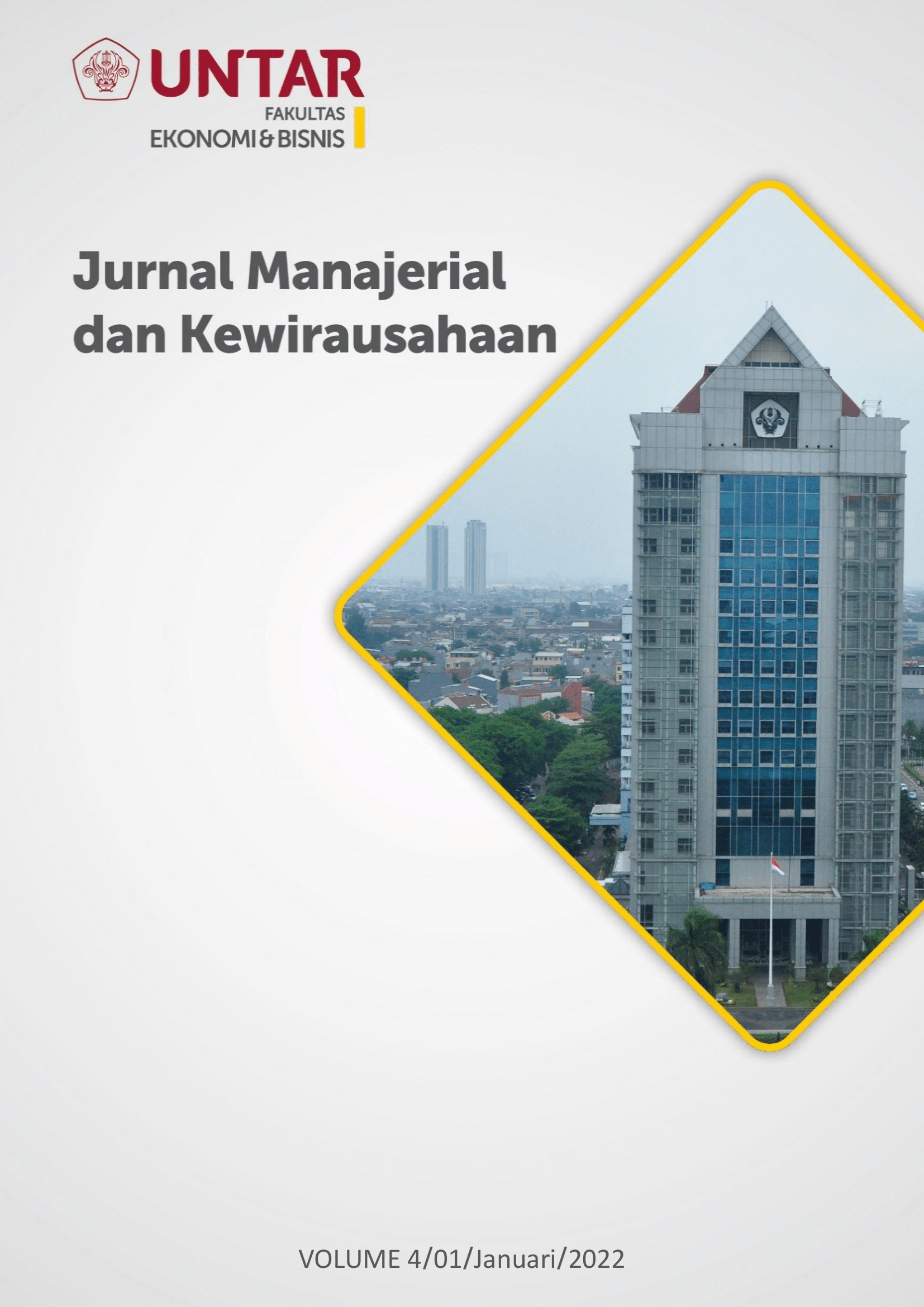Pengaruh Gaya Kepemimpinan, Disiplin Kerja dan Kepuasan Kerja terhadap Kinerja Karyawan
Main Article Content
Abstract
Tujuan penelitian ini adalah untuk mengetahui dan menganalisa pengaruh gaya kepemimpinan, disiplin kerja dan kepuasan kerja terhadap kinerja karyawan PT XYZ. Penelitian ini dilakukan dengan metode probability sampling dengan teknik purposive sampling. Peneliti mendistribusikan kuesioner ke 100 pimpinan dan karyawan di PT XYZ. Analisis data dilakukan dengan analisis PLS-SEM. Hasil pengujian hipotesis menunjukkan bahwa gaya kepemimpinan, disiplin kerja, dan kepuasan kerja memiliki pengaruh yang positif dan signifikan terhadap kinerja karyawan.
The purpose of this study is to find out and analyze the influence of leadership style, job discipline and job satisfaction on employee performance at PT XYZ. This research was conducted by probability sampling method with a type of purposive sampling. The researcher distributed questionnaires to 100 leaders and their sub-ordinates at PT XYZ. Data analysis using PLS-SEM analysis. The results of hypothesis testing prove that leadership style, job discipline and job satisfaction have positive and significant value on employee performace.
Article Details
Section
This work is licensed under a Jurnal Muara Ilmu Ekonomi dan Bisnis Creative Commons Attribution-ShareAlike 4.0 International License.,/p>
References
Abdillah, W., & Hartono, J. (2015). Partial Least Square (PLS). Yogyakarta: Andi.
Aguinis, H., Gottfredson, R. K., & Joo, H. (2013). Avoiding a “me” versus “we” dilemma: Using performance management to turn teams into a source of competitive advantage. Business Horizons, 56(4), 503-512.
Dessler, G. (2005). Human Resource Management, 15e. Pearson Education India.
Dessler, Gary. (2016). Manajemen Sumber Daya Manusia, Jilid 1 Edisi 10, Alih Bahasa: Paramita Rahay, (2016), Indeks, Jakarta.
Farooqui, M. S., & Nagendra, A. (2014). The impact of person organization fit on job satisfaction and performance of the employees. Procedia economics and Finance, 11, 122-129.
Ghozali, I. (2014). Structural Equation Modeling: Concepts and Applications with AMOS program 22.0. Semarang: Publisher Agency Diponegoro.
Hersey, P. (1992). The situational leader (4th ed). Escondido, CA: Center for Leadership Studies.
Iheanacho, M. U., Edema, A. J., & Ekpe, E. O. (2017). Perceived discipline, punishment and organizational performance among employees of federal ministries in cross river state. Global Journal of Educational Research, 16(1), 15-20.
Juma, C. A., & Moronge, M. (2015). Influence of Progressive Discipline of Employee Performance in Kenya: A Case OF Mukurwe-Ini Wakulima Dairy Ltd. Strategic Journals of Business & Change Management, 2(105), 1549-1594.
Kelimeda, K., Hairudinor, H., Ridwan, M. N. I., & Dalle, J. (2018). The effect of motivation, job satisfaction and job discipline toward employee performance of PT. Buma Perindahindo At Lng Tangguh Site, Teluk Bintuni Regency, West Papua, Indonesia. European journal of human resource management studies.
Lor, W & Hassan, Z. (2017). The Influence of Leadership on Employee Performance Among Jewellery Artisans in Malaysia. International Journal of Accounting and Business Management, 5(1), 14-33.
Nath Gangai, K., & Agrawal, R. (2015). Job satisfaction and organizational commitment: Is it important for employee performance. International journal of management and business research, 5(4), 269-278.
Obasan Kehinde, A., & Hassan Banjo, A. (2014). A test of the impact of leadership styles on employee performance: A study of department of petroleum resources. International Journal of Management Sciences, 2(3), 149-160.
Pacitti, A. (2011). Efficiency Wages, Unemployment, and Labor Discipline. Journal of Business & Economics Research (JBER), 9(3).
Robbins, P. Stephen. (2006). Perilaku Organisasi. Edisi Sepuluh. Diterjemahkan oleh: Drs. Benyamin Molan. Erlangga, Jakarta.
Robbins, S. P., & Judge, T. (2016). Organizational Behavior.
Schermerhorn, J. R., & Bond, M. H. (1997). Cross?cultural leadership dynamics in collectivism and high power distance settings. Leadership & Organization Development Journal.
Sugiyono. (2018). Metode Penelitian Manajemen. Bandung: Alfabeta
Yanuar, Y. (2017). Compensation, motivation and performance of employees: Evidence from Indonesia. Journal of Economic & Management Perspectives, 11(4), 486-492.
Yanuar, Yenny. L., Ronnie, R.M.. (2019) “Job Performance and Government Banks: Evidence from Indonesia” International Journal of Innovation, Creativity and Change. www.ijicc.net Volume 6, Issue 11, 2019.

